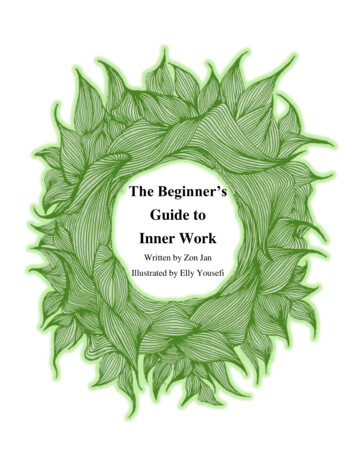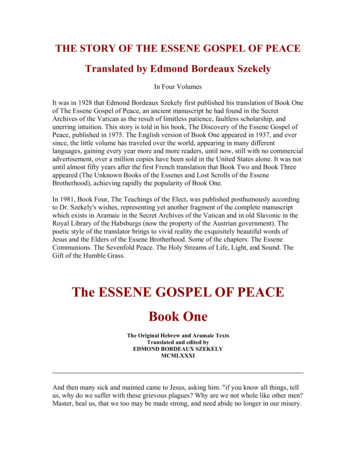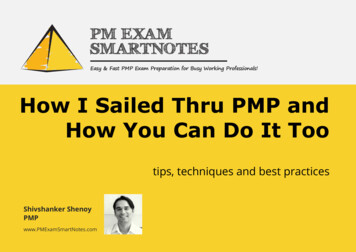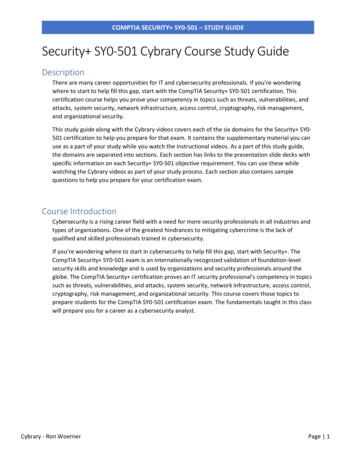
Transcription
You are a guide of Orthodoxy, a teacher of piety andmodesty,d t a lluminaryioff ththe world,ld ththe GGod-inspireddii dpride of monastics. O wise Maximus, you haveenlightened everyone by your teachings. You are thep of the Spirit.pIntercede to Christ our God for theharpsalvation of our souls.Apolytikion for Feast of St Maximus (January 21)Dr Nick Trakakiswww.goyouth.org.au
Whoh was StS Maximus?i? born 580, Constantinoplep died 13 August 662, Lazica the greatest of Byzantine theologians: “M“Maximusitheh ConfessorC fstandsd out as theh most productived iand significant theological figure in either eastern orwestern Christendom during the seventh century.”(Neil & Allen) Maximus “in many respects, may be regarded as the realFather of Byzantineytheology.”gy ((Meyendorff)y) a bridging figure between the churches of East and West titletitl off “C“Confessor”f”www.goyouth.org.au
Background to MaximusMaximus’life and work Transitional period between early and medievalChristianity Age of Justinian: emperor 527–565o Soughtg to restore the Roman Empirepto its former gloryo Building program: Hagia Sophiao War with Persia: 50 years’ truceo Church – State relations:battle with Monophysitismwww.goyouth.org.au
Justinian I:mosaic in the Church ofSan Vitale, Ravenna, ItalyByzantineBi EmpireE iat the death of Justinian: 565 ADwww.goyouth.org.au
Byzantine Empire 668 ADwww.goyouth.org.au
Monophysites Christ has only one nature (physis,(physis φύσις) a divine nature Christ’s humanity is engulfed by his divinenature rejected the Council of Chalcedonwww.goyouth.org.au
Council of Chalcedon (451) Fourth Ecumenical Council rejected the Monophysite view of Christ Definition of Chalcedon:Christ is to be “recognised in two natures, withoutconfusion, without change, without division, withoutseparation [εν δύο φύσεσιν,φύσεσιν ασυγχύτωςασυγχύτως, �ς, αχωρίστως]; the distinction in natures beingin no way annulled by the union, but rather thecharacteristics of each nature being preserved andcoming together to form one person and subsistence[υπόστασις], not as parted or separated into two persons,but one and the same Son and Only-begotteny gGod theWord, Lord Jesus Christ.”www.goyouth.org.au
OrigenistsOrigeng (c. 185 – c. 254) the most important theologian and biblical scholar of theearly church controversial figure, charged with many heresies On First Principles: a systematic statement of Christiandoctrine on an ambitious scaleOrigenists: e.g. Evagrius Ponticus, Leontius of Byzantiumpre-existence of souls as ppure intellectual beingsg that the passumed flesh and became sinful apokatastasis: the reconstitution of fleshly beings in angelicshapep and unified with God asceticism as the main path to salvationwww.goyouth.org.au
Cyrillian Chalcedonians Cyrily of Alexandria ((378 – 444)) patriarch of Alexandriaμία φύσις του Θεού Λόγου σεσαρκωμένη “oneone nature [or hypostasis?] of the Divine Word incarnateincarnate”the Logos and the flesh in Christ are a hypostatic unityCyrillian Chalcedonians were the majority at the Council of Chalcedond idominateddBByzantinei theologyh lini theh 6th6 h century andd won thehsupport of Justinianno contradiction between Cyril and Chalcedonwww.goyouth.org.au
Maximus’ early years Was born of noble and pious parents in Constantinople. Received a good education. Syriac biography gives a different account of MaximusMaximus’early years. In his early 30s, joined the imperial service of emperorHeraclius.www.goyouth.org.au
Emperor Heraclius Eastern Roman emperor:p610–641 Empire: external threats, internal tensions successful campaign against the Persians:o 627627: returnedd to CConstantinopleil ini triumph,ih andd was hailedh il d as aMoses, an Alexander, a Scipioo Byzantines reclaimed all the territory they had lost since 613,including the cities of Caesarea, Antioch, Damascus, Jerusalem,and much of Egypt 630: ppersonallyy restored the Cross to the Church of the HolyySepulchre in Jerusalem replaced Latin with Greek as the official language marriedi d hishi niecei(M ti ) caused(Martina):d offenceffwww.goyouth.org.au
Maximus’ imperial service worked as protasecretis (πρωτασηκρήτις)head of the college of asekretisChief Secretaryenormous influencerole: to supervise imperial notaries and manage courtarchives about 613-14,, he withdraws to a monasteryy www.goyouth.org.au
Monastic life became a monk at a monastery near Chrysopolis inBithyniao Chrysopolis: modern Scutari, jjust over the Bosphorus fromthe capital. Motivation: love for the life of quiet prayer and solitude Later he acquires a disciple, Anastasius, who was to behis constant companion for 37 years. 6 or 7 years later,llleavestheh monastery at Chrysopolishland goes to the monastery of St George at Cyzicus.o HisHi earliestli t writingsitiddatet tto thithis CCyzicusiperiod.i dwww.goyouth.org.au
Flight to North Africa crisis of 626: Persian invasion, also Avars and Slavsconverging on Constantinople flees to Carthage,g north Africa stopovers on his way to Africa: Cyprus, Crete arrives in Carthageg ((byy 630)) reputation grows, writes major works relationshipp with Sophroniusp(future Patriarch of Jerusalem)www.goyouth.org.au
Monothelitisml from μόνος and θέλημα Christ has only one will emperor Heraclius saw Monothelitism as a compromisebetween Chalcedonians and MonophysitesDeveloped from Monoenergism: fromfμόνοςόandd ενέργειαέ Christ has one energy or activity attributed to his individualhypostasisQuestion: Do Monoenergism and Monothelitism entailMonophysitism?www.goyouth.org.au
Plan of Reunion devised by Heraclius (emperor) and Sergius (Patriarchof Constantinople) aim was to unite Christian ggroupsp of the East: esp.p theChalcedonians and the Monophysites 630s: various reunions achieved, most famous casebeing Egypt Cyrus (Κύρος, Patriarch of Alexandria, 631-42) Cyrus “Pact of Union” (633): brought many nonChalcedonians of Alexandria back into union with thechurch of Constantinoplewww.goyouth.org.au
The “Psephos” and the “Ekthesis”The “Psephos”p((634)) the judgment (psephos) of Sergius about the Pact of Union devisedby Cyrusforbade mention either of one or two operationspof Christaim was to avoid controversyThe “Ekthesis”Ekthesis (638) issued by Heracliusin substance the same as the Psephos, but this time with theemperor’ss signatureemperorled to intense controversya couple of months later, Sergius died (December 638)chiefhi f defenderd f d off ththe EkthesisEkth i becamebP h (newPyrrhus(patriarcht i h offConstantinople)www.goyouth.org.au
Great debate of 645 Maximus engages in debate with Pyrrhuso Pyrrhus: no longer patriarch of Constantinople, nowabbot of the monasteryy of Chrysopolisy p this is Maximus’ first public defence of the dyothelite(or “two will”) position held at Carthage result: Pyrrhusyacceptsp orthodoxy,y and is ppersuaded todeclare his abandonment of Monothelite doctrine at thepapal courtwww.goyouth.org.au
The “Typos” of Constans Constans II: emperor 641641-6868 648: issued an edict (“Typos”) requiring adherence toOrthodoxyy and forbiddingg all discussion of the qquestionover Monothelitism Endorsed also by patriarch Paul of Constantinople The decree was posted up in the exo-narthex of HagiaSophia for public view.www.goyouth.org.au
Rome’s reaction Pope MartinLateran Synod (649) convened by Pope Martin Maximus present, together with 105 bishops(Maximus was in Rome since 646) denounced Typos of Constans Maximus also rejected Typos: The truth should never be silenced. A unioni achievedhid on ththe bbasisi off suchh a strategyt tcan onlyl bbe afalse union.Constans considered rejection of the Typos as treason 653:653 PPope MartinM ti andd MaximusM iarrestedt d andd ttakenk totConstantinoplewww.goyouth.org.au
Maximus’ first trial (655) “showshow trialstrials” Maximus was 75 years old. Charges made against him: treason against the emperor violation of ((civil and ecclesiastical)) law theological accusations Exiled to Bizyay in Thrace. Resistance to Monothelitism was now virtually reducedto one man – the monk Maximus.www.goyouth.org.au
Maximus in exile continued his antianti-monothelitemonothelite activities in Bizya Dispute at Bizya (August 656): held a dispute withp of Caesarea Bithynia,yon the subjectjTheodosius, bishopof the number of wills and energies in Christ. Outcome: Maximus’ wins over Theodosius, and thensuggests that the bishop persuade the emperor and thepatriarch of Constantinople to renounce their hereticalviews.iews But Theodosius was to change his position a month orso later.laterwww.goyouth.org.au
Maximus’ second trial (656) Interrogated by imperial emissaries. ThreatenedTh td MaximusM iwithith anathemathandd deathd th if hhe ffailedil d ttorejoin communion with the church of Constantinople. Maximus refused, and so he was exiled to Perberis, inThrace. Spentp6yyears there.www.goyouth.org.au
Maximus third trialMaximus’((662)) St Maximussurrounded by hispersecutors Trial held in Constantinople. Was asked to endorse the Typos, but Maximusrefused. Maximus was stripped of his status as a monk,beaten savagely, and thrown into prison.prison On the next day, his tongue and right hand wereamputated. The same was done to Anastasius the Disciple.They were then taken about the city, exposed to thescorn of the populace.p p Then shipped off to exile in Lazica.www.goyouth.org.au
Map of Europe: 700 ADwww.goyouth.org.au
Death of Maximus 13 August 662: died in the wilderness near the Black Sea.Over 80 years of age.Died abandoned, except for his two disciples.No protest from anyone.anyone “Friends are abundant – that is, in times of prosperity. In time of trialyou can barely find one.” (CC IV.94) 6th Ecumenical Council in Constantinople (680-81):Maximus finally vindicated.www.goyouth.org.au
Maximus’ writings Centuries on Love arranged in groups of 100 – a century Ambiguag Ambiguum 7: “the single most significantanti-Origenist writing from Greek patristicliterature” (Hans Urs von Balthasar) Mystagogia: a treatise on liturgicalsymbolismb li Biblical commentaries, letterswww.goyouth.org.au
Deification the goal of life is deification (θέωσις) We are called to be “partakers of the divine nature” (2Peter 1:4),) to become byyggrace what God is byy nature. “For unto this He made us, that we might become partakersof the divine nature and sharers of His eternity, and that weappear liklike to HiHim accordingdi to theh ddeificationifi i off grace, onaccount of which there exists and abides the system ofg , and the creation from nothingg of non-existentcreated things,things.” (Maximus, Epistle 24) parallelism between Incarnation and deification deification of all creation: “cosmic theology”www.goyouth.org.au
απάθεια – αγάπη απάθεια: passionlessness, impassibilitystuggle against the passions“Passion is a movement of the soul contrary to nature eitherg or on accounttoward irrational love or senseless hate of somethingof something material. For example, toward irrational love of food,or a woman, or wealth, or passing glory or any other material thingor on their account. Or else it can be toward a senseless hate of anyoff theh precedingdthingshwe spokek of,f or on account off any one.””(CC II.16)Not all passions are bad or harmful.αγάπη: love – the true heart of Maximus’ theologyBut how to reconcile Maximus’ emphasis on apatheia and hiseemphasisp as s oon tthee cucultivationt at o oof “thet ebblessedessed passpassiono oof holyo y love”?o e ?www.goyouth.org.au
“ForFor the mind of the one who is continually with Godeven his concupiscence abounds beyond measureinto a divine desire and whose entire irascibleelement is transformed into divine love. For by anenduring participation in the divine illumination ithas become altogether shining bright,bright and havingbound its passible element to itself it, as I said, turneditt arounda ou d to a never-endingeve e d g ddivinev e desdesiree aandd aanunceasing love, completely changing over fromearthly things to divine.”(CC II.48)www.goyouth.org.au
SelectSeect passages fromo ttheeCenturies on Love 1. Love is a good disposition of the soul by which one prefers no creature to theknowledge of God.God It is impossible to attain a lasting possession of this love if one hasany attachment to earthly things.2. Love springs from detachment, detachment from hope in God, hope from patientendurance and long-suffering; and these from all-embracing self-mastery; selfmasterytffrom ffear off GGod,d andd ffear off GGodd ffrom ffaithith iin ththe LLord.d13. The one who loves God cannot help but love also every man as himself, even thoughhe is displeased by the passions of those who are not yet purified. Thus when he seestheir conversion and amendment, he rejoices with an unbounded and unspeakablejoy.17. Blessed is the man who has learnt to love all men equally.18. Blessed is the man who is not attached to any corruptible or transitory thing.19 Blessed is the mind which has gone beyond all things and takes unceasing delight in19.the divine beauty.33. The mind is pure when it is removed from ignorance and illuminated by divine light.34. The soul is pure when it has been freed from the passions and rejoices unceasingly indi i love.divinelwww.goyouth.org.au
Maximus present, together with 105 bishops (Maximus was in Rome since 646) denounced Typos of Constans Maximus also rejected Typos: The truth should never be silenced. A uni hi d th b i f h t t l b ion achieved o











